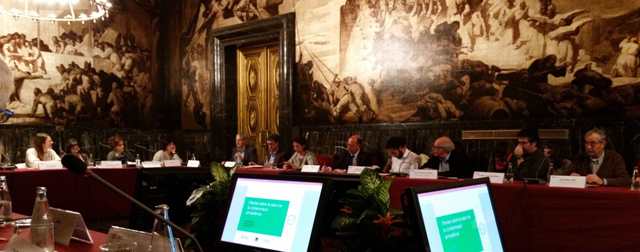Technicians and scientists will propose measures against pollution in Barcelona
The proposals come from a working group composed by municipal technicians of health and environment along with scientists from CREAL and CSIC.
02.12.2015

Cristina Ribas (ACCC). The Government of Catalonia announced a few days ago the suppression of the bonuses for diesel vehicles because they generate up to five more of one of the most polluting and toxic agents (NO2), than the approved value in the laboratory tests. The Volkswagen scandal has enabled to know that emissions of certain vehicles are higher than previously thought.
On November 24th, at the new Table for Air Quality (Taula per la Qualitat de l'Aire), the City Council of Barcelona committed to develop and implement measures to address the problem of episodes exceeding the allowed limits and lay the foundations for structural changes. In both cases, the proposals come from a working group composed by municipal technicians of health and environment along with scientists from the Centre for Research in Environmental Epidemiology (CREAL), an allied ISGlobal center, and the CSIC.
During the presentation of the Table, formed by institutions and experts, the most troubling data on pollution levels were shown by the Public Health Agency of Barcelona, which controls a set of stations integrated into the Network of Monitoring and Estimation of Air Pollution in Catalonia (XVPCA). The monitoring results indicate that Barcelona exceeds the limits of annual average concentration, established by the European Commission since 2010 in 40 µg/m3.
Jordi Sunyer, researcher and joint scientific director of CREAL, explained the results of research on the effects of these pollutants on health, according to data gathered by the international scientific community since 1990 worldwide. Initially, pollution was related with respiratory diseases but, recently, strong evidence has been found of a greater impact on the development of cancer and cardiovascular and neurological diseases. The legal limit in Europe, according to these studies, is not enough to ensure the health of people, so the World Health Organization recommends lowering it down to 20 µg/m3.
The measures to reduce pollution significantly should be diverse. Since one of the main causes is the mobility, they will focus mainly on reducing traffic. The goal of the City Council is reducing it by 21% in order to achieve the European legal standards.
According to data from 2014, about 6.5 million trips are made daily in Barcelona: 4.7 million are internal trips and 1.8 million are internal-external trips. Of these internal trips, 55.6% are on foot and by bicycle, 29.3% are by public transport and 15% are in private vehicle. Instead, 44.2% of external trips are made in private vehicle, 52.4% in public transport, and only 3.4% by non-motorized vehicles.
The Platform for Air Quality, created last April with the participation of more than 70 entities among which is the ACCC, elaborated a manifesto calling for actions to government leaders. All political parties that took part in the elections of 27S were in favor of adopting them in a debate organized by the Platform in the College of Journalists of Catalonia.
One of the measures proposed by the Platform that was incorporated in the Table is the creation of Low Emission Zones, areas where circulation is allowed only to the least polluting vehicles clearly labeled. These areas are already operational in cities like Berlin. On this matter, it is necessary to have the corresponding labels of the General Directorate of Traffic Service. But for now, only the labels for 100% electric vehicles have been issued.
The Platform also stressed that there is a public campaign to raise awareness about this serious problem, often unseen, addressed to the population of the city. Also, they reminded the need to know as soon as possible the specific plan for the Port of Barcelona, which is a major source of pollution.
Other entities reminded the need to involve everyone related with this subject and also the need to project a metropolitan vision, since pollution is a problem originated and concentrated in this area.
* * * *
Picture: Cristina Ribas (ACCC) / Original news: ACCC



